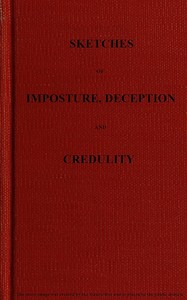Sketches of Imposture, Deception, and Credulity by R. A. Davenport
"Sketches of Imposture, Deception, and Credulity" by R. A. Davenport is a historical account written in the mid-19th century. The work delves into the nature of belief and deception throughout human history, examining how credulity has often led people to be misled by cunning impostors. Davenport's exploration spans a wide array of subjects, including ancient oracles, false prophets, and the impact of credulity on societal beliefs. The opening of this work introduces
the reader to the themes of incredulity and credulity, discussing how belief can be essential for social cohesion yet also a breeding ground for folly. Davenport critiques the ways in which impostors have exploited the credulity of the masses, providing a framework for the subsequent chapters that investigate historical examples of deception, from ancient oracles in Greece to more modern instances of false prophets. By laying out these foundational thoughts, the author sets the stage for a deeper investigation into the interplay between human psychology, societal expectations, and the enduring quest for truth. (This is an automatically generated summary.)
Read or download for free
| How to read | Url | Size | |||
|---|---|---|---|---|---|
| Read now! | https://www.gutenberg.org/ebooks/61993.html.images | 605 kB | |||
| EPUB3 (E-readers incl. Send-to-Kindle) | https://www.gutenberg.org/ebooks/61993.epub3.images | 534 kB | |||
| EPUB (older E-readers) | https://www.gutenberg.org/ebooks/61993.epub.images | 533 kB | |||
| EPUB (no images, older E-readers) | https://www.gutenberg.org/ebooks/61993.epub.noimages | 322 kB | |||
| Kindle | https://www.gutenberg.org/ebooks/61993.kf8.images | 668 kB | |||
| older Kindles | https://www.gutenberg.org/ebooks/61993.kindle.images | 620 kB | |||
| Plain Text UTF-8 | https://www.gutenberg.org/ebooks/61993.txt.utf-8 | 538 kB | |||
| Download HTML (zip) | https://www.gutenberg.org/cache/epub/61993/pg61993-h.zip | 455 kB | |||
| There may be more files related to this item. | |||||
Similar Books
About this eBook
| Author | Davenport, R. A. (Richard Alfred), 1777?-1852 |
|---|---|
| LoC No. | 16007484 |
| Title | Sketches of Imposture, Deception, and Credulity |
| Note | Reading ease score: 50.1 (10th to 12th grade). Somewhat difficult to read. |
| Credits |
Produced by MFR, Robert Tonsing, and the Online Distributed Proofreading Team at https://www.pgdp.net (This file was produced from images generously made available by The Internet Archive) |
| Language | English |
| LoC Class | AZ: General Works: History of scholarship and learning, The humanities |
| Subject | Impostors and imposture |
| Subject | Common fallacies |
| Category | Text |
| EBook-No. | 61993 |
| Release Date | May 2, 2020 |
| Copyright Status | Public domain in the USA. |
| Downloads | 196 downloads in the last 30 days. |
| Project Gutenberg eBooks are always free! | |


